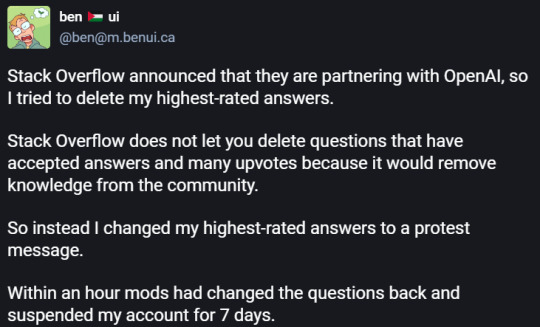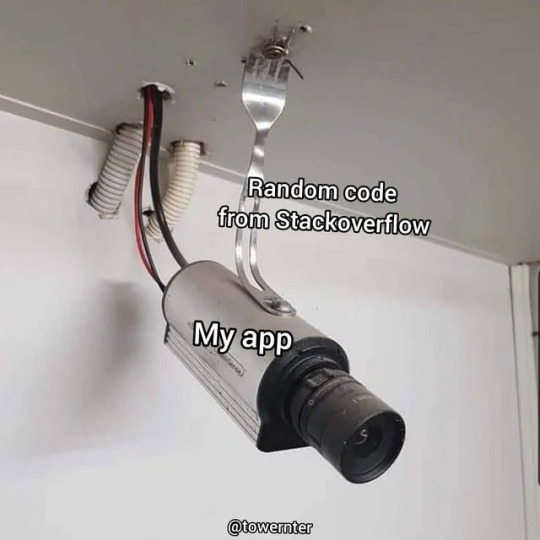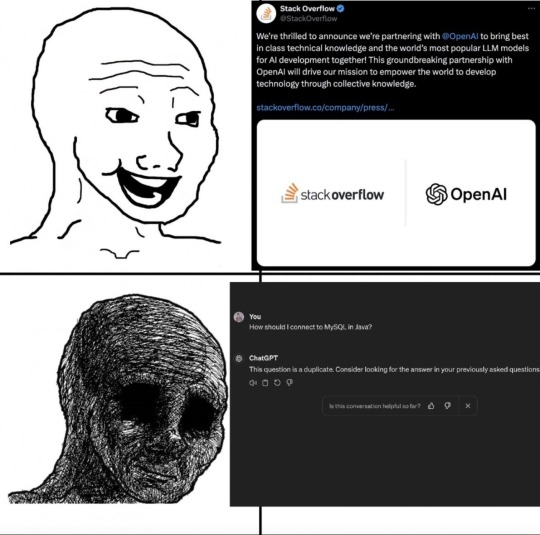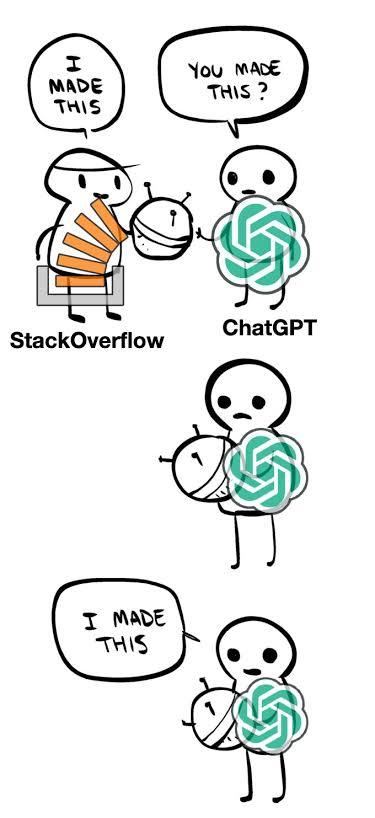#stack overflow
Explore tagged Tumblr posts
Text
There are people in this world who approach all communication as a form of intellectual combat which is "won" by deliberately providing the most obstructive and least informative possible answer which technically satisfies the precise letter of the stated request, and literally all of them are on Stack Overflow.
2K notes
·
View notes
Text
Everyone should immediately stop contributing to the stack overflow and its network. The human touch is what made it unique. Delete your profile from SO AND all your answers. Freeloaders are making money out of human contributions.

2K notes
·
View notes
Text

Are you posting to Stack Overflow?
Be aware that they're now scraping the site to feed LLMs so maybe rethink that. Also they appear to be jerks about allowing people to curate/delete their own accounts.
37 notes
·
View notes
Text
Your Code Is Hard To Read!
This is one of those posts I make not because I think my followers need to hear them, but because I want to link to them from Discord from time to time. If you are a Moderator, Contributor or "Helpfulie" on the PyGame Community Discord, I would welcome your feedback on this one!
"You posted your code and asked a question. We can't answer your question. Your code is hard to read."
Often when we tell people this, they complain that coding guidelines are just aesthetic preferences, and they didn't ask if their code followed coding guidelines. They asked us to fix the bug. That may be so, but the problem remains: If you ask us to fix your code, we can only help you if we can read it.
Furthermore, if there are many unrelated bugs, architectural problems, and hard to understand control flow, the concept of fixing an isolated bug becomes more and more unclear.
In order to fix unreadable code, you could:
eliminate global variables
replace magic numbers with constants
replace magic strings with enumerations
name classes, functions, constants, variables according to consistent coding standards
have functions that do one thing and one thing only like "collision detection" or "collision handling". If your function does two things at the same time, like rendering AND collision detection, then it must be refactored
rewrite deeply nested and indented code to be shallower
rewrite code that keeps a lot of state in local variables into special-case functions
use data structures that make sense
write comments that explain the program, not comments that explain the programming language
delete unneccessary/unreachable code from the question to make it easier to read or from your program to see if the problem persists
My own programs often violate one or more of those rules, especially when they are one-off throwaway scripts, or written during a game jam, or prototypes. I would never try to ask other people for help on my unreadable code. But I am an experienced programmer. I rarely ask for help in an unhelpful way. Almost never ask for help in a way that makes other experienced programmers ask for more code, or less code, or additional context. I post a minimal example, and I usually know what I am doing. If I don't know what I am doing, or if I need suggestions about solving my problem completely differently, I say so.
Beginner programmers are at a disadvantage here. They don't know what good code looks like, they don't know what good software architecture looks like, they don't know how to pare down a thousand lines of code to a minimal example, and if they try to guess which section of code contains the error, they usually guess wrong.
None of this matters. It may be terribly unfair that I know how to ask smart questions, and beginner programmers ask ill-posed questions or post code that is so bad it would be easier and quicker for an experienced programmer to re-write the whole thing. It is often not feasible to imagine what the author might have intended the code to work like and to fix the bugs one by one while keeping the structure intact. This is not a technical skill, this is a communicative and social skill that software engineers must pick up sooner or later: Writing code for other people to read.
If your code is too hard to read, people can't practically help you.
It gets worse. Unreadable code is sometimes unreadable because it is un-salvageable. It is hard to understand because there is nothing to understand, it would not work, and you need to go back to the drawing board.
Defensive Responses
This is not where the problem ends. Often, after a couple of rounds of back and forth, after questions like "Well, you say there is a bug, but can you tell me what you would want the code to do in the first place?", or "Is this a class or an instance? If it's supposed to be an instance variable, could you give it a lowercase name?" or "Could you give that variable _obj a more descriptive name? It looks like you are assigning different things to this variable in different parts of your loop. Perhaps you could use two variables with different, more descriptive names", you see a defensive response. The original question asker is not interested in making code easy to read, just in making it work. As I explained above, this is a confused way of thinking, because ill-posed questions and unreadable code make it difficult to impossible to make the code work, or to even understand what making it work would look like.
"Style is irrelevant." – This is by far the most common one. Since coding style, comments, variable names, and even re-factoring code into smaller functions do not affect the output, and thus not the correctness of the program.
"I asked for help with bugs, not style." – This is a variation on the first one. As long as there is no concrete and discrete bug, style feedback and questions for clarification can be discarded.
"This is too much work." – The original poster explains that making the code more readable is too much work for them, and fixing the bugs would be easier for others.
"Nobody will see the code anyway" – Nobody will see the code of the finished product, so it's irrelevant. Sometimes there are variations like "We aren't graded on code quality, only correctness" or "This is for a class project, nobody will depend on the code, so we don't need robustness."
"This is just throwaway code, it doesn't have to be good." – Like the previous one, this is frustrating to read because somebody posted the code on a forum for other people to read and asked them to understand it, and then said he doesn't care if it's readable or debuggable.
"I asked you for help." / "I am asking the questions here." – The original poster refuses to answer questions, because he asked, he expects answers, not questions in return.
"Don't blame me, I didn't write it" – We have completely left the realm of correctness and style now. The poster knows the code is unreadable, or doesn't make sense. He tried to protect his reputation. But he doesn't like the tone of the responses. Its not his fault the code doesn't make sense. It's not his fault if it doesn't work. Common variations are "This must be correct, it was the accepted answer on StackOverflow", or "I copied this from a tutorial", or "Don't blame me, this was written by GitHub Copilot". Often part of the problem is that the code has different parts written in different styles, or uses different data structures in different places, and both parts could benefit from a re-write to make them more consistent with each other. At other times the problem is that the code from the book is "correct" for certain purposes from the book, but not really suited for the problem at hand.
"I apologised already" – The poster is frustrated because he said "I am sorry I am a n00b" or "I am sorry for my bad English" already. Then somebody said his code is unreadable or his prose makes no sense. The poster sees readable code, or at least code that is readable enough to understand what the idea was, as a courtesy, as a social custom, not as something necessary to make the whole question and answer thing work. The same goes for a firm grasp of English. The poster apologised already that his English is bad, and you should just see past it. Dealing with this is especially difficult, because Q&A is framed as some kind of status game, and the poster is trying hard to save face already. Push-back will make him feel like he is losing face, and he will only get more defensive.
Causes
So where does the problem begin? Why do people write unreadable code, post it online, and get defensive? I think the answer is a combination of programming skill, social skill, and simplistic mental models.
Software Engineering is Difficult: Obviously, one root cause is that beginner programmers can't already write readable code from the start. Writing readable, well-factored code that is easy to debug, re-use, and adapt is something that comes with experience. Writing code for other people to read can only be learned after one has learned to write code.
Magical Thinking/Limited Cognitive Empathy: The most common and most direct cause of this phenomenon – the refusal to help others read your unreadable code – is not the unreadable code itself. It is the belief that it should be easy for experienced programmers to understand the structure of and intent behind a piece of code, even if the person who wrote it didn't. If you see software as basically magic, and don't see computers as soulless automatons that do what they do because they are built that way, then this is an easy trap to fall into.
A variant of this works for language. If somebody is bad at English, or bad at the technical jargon needed to ask his question, he will often think that the question he thought up in his native Klingon was perfectly well-formed, and that other people should have no trouble reading his words, because they also think in Klingon, so they would translate it into a question that makes sense anyway.
Status-Consciousness: Many beginner programmers feel the desperate need to distinguish themselves from other beginners, and if they have been learning JavaScript for two months now, they want to be seen as real programmers, not as children who play with Scratch and build Redstone contraptions in MineCraft. They want to be taken seriously. This reminds me of a five year old boy who stretches out his arm and tells me he is THIS BIG, and he is already FIVE, going on SIX, and he will go to SCHOOL soon.
Naive Mental Model of De-Bugging: Every program has a certain number of discrete features bugs, and when you remove all bugs, you end up with a program that works. This is of course nonsense. You can write a program that has an indeterminate number of bugs, or a program that implements an algorithm that doesn't quite work, or a useless program, or a program that does random nonsense.
With any luck, sooner or later, programmers will learn the technical side, and the social and collaborative side of software development.
76 notes
·
View notes
Text
Relistening to the Sicko Shock saga, and just finished episode 3 and my heart has been ripped out. Sobbing. Native Resolution was too pure for this world.
25 notes
·
View notes
Text
Úrstn irl élem azt a memet ahol a számítózós ember keres problémára választ online, és megtalálja stackoverflow -n ugyanazt a kérdést, csak 5 évvel előbbről, majd kiderül h nem volt válasz már akkor se....
.... lejjebb görgetve VAN VÁLASZ A KÉRDÉSEMRE!!!!!!!
7 notes
·
View notes
Text
so you all know i'm one of those people who's very much in support of leaving comments on old fics if you liked them, because the author probably still wants to know if someone is loving their old fic
(i've probably reblogged some tumblr posts to this effect)
but i was just browsing stack overflow and saw the comments on one of the answers, and the first (oldest) one said something to the effect of "it's been 8 years, but this is still great :)" and others were all just praising the answer, remarking on how helpful it still was even so many years later; another comment, from 10 years later just said "brilliant. perfect."
and it occurred to me that for all the times that i've reblogged posts about commenting years later, or posts that said something to the effect of, "if you don't have the time or energy to give a more in depth comment, just saying 'loved it' is enough to make an author's day",
i have literally never commented on a stack overflow answer (unless i had a technical comment, ie the kind of comment that would probably be called 'con-crit' over in fandom and frowned upon), even when it made my life immeasurably better
... and i probably still won't, since people so rarely do and i would feel awkward and weird being the only one making a non-technical comment, but there have been so many times when i've wanted to, and gosh i wish letting someone know when they improved your day were part of the culture, there, too
(i do get why stack overflow's culture would want to prioritize actually technically relevant comments, because if you're just looking for a discussion so you can all arrive at the correct answer, that's probably more important than letting the author know how much you loved their answer and how helpful you found it,
but gosh, there have been times when i'd been struggling with something for ages and someone wrote exactly what i needed and i just wanted to virtually kiss them for it. maybe there should be a separate thank-the-author comment section)
7 notes
·
View notes
Text
I love stackoverflow because people will get sooo bitchy in the comments
I just had a question about PyTorch bullshit and now I get to watch John and hatsunemiku7345 team up to flame aaronfromkentucky for saying a very helpful answer isn’t relevant to the original question
6 notes
·
View notes
Text

#the structural integrity of a blancmange#but if it works it works#nerdy memes#memes#meme#nerd humour#programming#programming meme#stack overflow
18 notes
·
View notes
Text

This is how openai x stackoverflow is gonna look like
4 notes
·
View notes
Text
[..] by using the Online Services, posting, uploading, inputting, providing or submitting content you are granting Microsoft, its affiliated companies and third party partners permission to use the Captions, Prompts, Creations, and related content in connection with the operation of its businesses (including, without limitation, all Microsoft Services), including, without limitation, the license rights to: copy, distribute, transmit, publicly display, publicly perform, reproduce, edit, translate and reformat the Captions, Prompts, Creations, and other content you provide; and the right to sublicense such rights to any supplier of the Online Services.
Bing Terms of Use
->
In the social media economy posting content was un-paid productive work, in the artificial intelligence industry prompts are. Just think about it: why would AI companies run free chats, when the output is just remixes of the existing material? Where is the productive input? It is in the prompts. The Bing terms of use provide an example, they grant them the "rights to: copy, distribute, transmit, publicly display, publicly perform, reproduce, edit, translate and reformat" your content, but more importantly, also your prompts.
We see how the current Stackoverflow debacle, where people thought a CC license would keep their questions and answers from becoming commodified, is related here. The collection of questions and answers was useful for Google because they could use search requests to directly display answers as if the search service was answering humanly. Services like ChatGPT and Bing are the next step, they function as a dialogue instead of a search box.
Copyright is a central issue in generative A.I. right now. Sure, stealing content and training LLMs with it needs legislation to protect creatives. At the same time, we could also see it as a creative tool, which only works through the productive work of prompt-forging (especially the negative prompts, which function as a fine-tuning). The bigger stealing happens again - like in social media - with the invisible work of the users, the real productive force, which is the human activity and creativity in the present creation of value, which goes into the work of the remix in its advanced form of generative artificial intelligence. Our interaction with Bing, ChatGPT, and similar services boils down to this, feeding them our creativity through prompts. These companies are not providing free services, but have a surveillance business model. And this model is shifting from advertising to industrialization of knowledge, to use all users as the workforce of a knowledge economy.
4 notes
·
View notes
Text


STACK OVERFLOW I do not recommend it, but I liked the art in this panel.
7 notes
·
View notes
Text
LOL

128 notes
·
View notes
Text
Stack Overflow's content ownership section is a lot more...robust? than most others I've seen. And I wonder how long it's been like that. Did they always demand ownership of all content, or was that changed in anticipation of selling off the data to AI? Either way, it's a warning shot to all of us.
However, Stack Overflow's Terms of Service contains a clause carving out Stack Overflow's irrevocable ownership of all content subscribers provide to the site.
2 notes
·
View notes
Text
Had a didn't believe it was true until it happened to me moment on a Stack Exchange site.
People complain that Stack Overflow/Stack Exchange closes questions for no reason. I have had a small number of questions closed before, but it's always been for a reason in hindsight that I thought was good.
Until this time where my question on the Open Source site got closed, in part because I researched my question before asking.
One of the other reasons was because the person recommending my question get closed couldn't find the answer after searching for it. Hmmm bro maybe if you don't close the question someone else who does know the answer can enlighten both of us. So sorry you're an ignorant piece of shit, but it happens to the best of us.
The main reason they gave for my question being closed was that it was asking for software recommendations. Except that I explained 3 times that I wasn't doing that. There is an objective answer to my question. I legit cited their own docs 3 times to explain that my question was 100% on-topic.
I think the difference might be that I look like a new user on Open Source SE and they're hostile to new users. I posted my question the same day I got my account. I've been on SO for over a decade. I was able to start gaining karma way back when privileged users were less hostile to newbies.
I always assumed that new users were complaining about getting questions closed because they didn't research existing answers or their question was off-topic. But now I realize it's more likely because you just joined yesterday and that means you must be excised from the private VIP club.
6 notes
·
View notes
Text
So, watched "The Boy and the Heron" yesterday.
What a trip.
A beautiful piece of art.
However, it drives me insane, that I cannot stop overthinking and analyzing it in my head.
I decided 3 times now to just file it away and let it be.
Bam.
It pops back in and once again I find myself rotating my mind and trying to wrap my head around all that I've seen...
Help.

5 notes
·
View notes